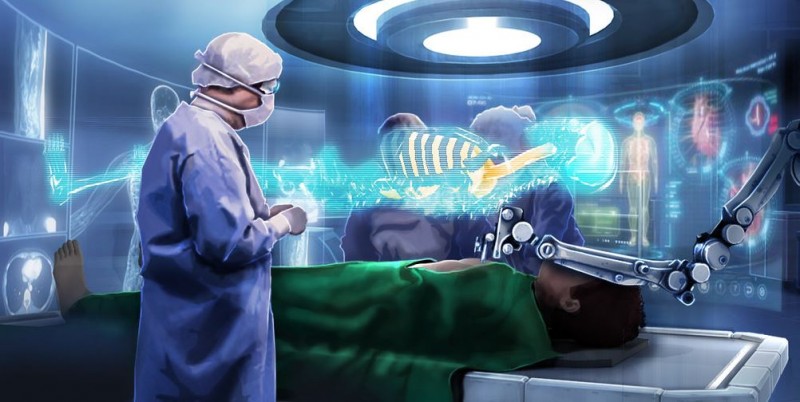
Augmented Reality (AR) is a revolutionary technology that has been transforming various industries, and healthcare is no exception. As medical practices continue to evolve, AR is paving the way for innovative solutions that improve patient outcomes, enhance medical training, and revolutionize healthcare delivery.
Benefits of Augmented Reality in Healthcare
Improved Surgical Precision
One of the significant advantages of AR in healthcare is its ability to enhance surgical precision. Surgeons can utilize AR overlays during complex procedures, providing them with real-time, three-dimensional visualizations of internal organs and structures. This invaluable tool allows for more accurate and minimally invasive surgeries, reducing the risk of complications and improving patient recovery.
Enhanced Medical Training
AR has opened new avenues for medical education and training. Medical students and practitioners can now engage in immersive learning experiences, simulating surgeries and medical procedures through AR-based simulations. This hands-on training approach enhances medical skills, builds confidence, and ensures better-prepared healthcare professionals.
Real-Time Data Visualization
In critical healthcare situations, quick access to patient data is essential. AR can integrate real-time patient information directly into a clinician's field of view, making it easier to interpret data and make informed decisions swiftly. From vital signs to medical history, AR-powered visualizations empower healthcare providers to deliver timely and precise care.
Better Patient Engagement and Education
AR technology enables healthcare providers to explain medical conditions and treatment plans to patients in a more comprehensible manner. Interactive AR models can display visual representations of illnesses, anatomy, and medical procedures, making it easier for patients to understand their health and actively participate in their treatment journey.
Applications of Augmented Reality in Healthcare
Medical Imaging and Diagnostics
AR is revolutionizing medical imaging and diagnostics by superimposing digital images onto the patient's real-world view. This capability aids in accurate diagnosis and treatment planning. For instance, AR can assist radiologists in locating tumors more precisely or guide sonographers during ultrasound examinations.
Surgery and Procedural Assistance
AR plays a crucial role in assisting surgeons during operations. By overlaying relevant information onto the surgical field, AR enables surgeons to navigate complex anatomical structures with improved accuracy. Additionally, AR can provide step-by-step guidance for specific procedures, making surgeries safer and more efficient.
Rehabilitation and Physical Therapy
In the realm of rehabilitation and physical therapy, AR offers interactive exercises and activities that motivate patients during their recovery journey. These AR-based therapies can help individuals regain motor functions, improve coordination, and enhance overall rehabilitation outcomes.
Medical Education and Training
AR-based medical education is transforming the way students learn and retain knowledge. By simulating medical scenarios and patient interactions, AR provides a risk-free environment for learners to practice their skills and gain hands-on experience, ultimately producing more competent and confident healthcare professionals.
Challenges and Concerns
Despite its incredible potential, the widespread adoption of AR in healthcare faces some challenges and concerns.
Privacy and Data Security
AR applications often require access to sensitive patient data, raising concerns about data security and privacy breaches. Healthcare organizations must implement robust security measures to safeguard patient information and comply with data protection regulations.
Integration and Adoption
Integrating AR into existing healthcare systems can be a complex process. It requires collaboration between technology developers, healthcare providers, and regulatory bodies to ensure seamless integration and widespread adoption.
Regulatory and Ethical Considerations
The use of AR in healthcare necessitates clear regulatory guidelines to address ethical concerns and establish best practices. Maintaining transparency and ensuring patient safety are paramount in the development and deployment of AR technologies.
Future Prospects of Augmented Reality in Healthcare
The future of AR in healthcare is promising, with ongoing advancements in technology and continued research efforts. As AR devices become more sophisticated and affordable, their integration into medical practices is expected to expand rapidly.
AR has the potential to revolutionize surgery, medical training, and patient care, ushering in an era of improved healthcare outcomes and enhanced patient experiences.
Case Studies and Success Stories
AR in Surgical Procedures
Numerous surgical specialties have witnessed successful implementation of AR technology. For instance, AR-guided orthopedic surgeries have shown remarkable improvements in accuracy and reduced operation times. Similarly, AR-assisted neurosurgery has enabled surgeons to navigate intricate brain structures more precisely, reducing risks during delicate procedures.
AR for Medical Training
Medical institutions are increasingly adopting AR-based training programs. For example, AR simulations have proven effective in teaching complex procedures, such as cardiac surgeries, to medical students and residents. These immersive experiences enhance learning retention and ultimately lead to better medical professionals.
Augmented Reality is reshaping the landscape of healthcare, offering groundbreaking solutions that benefit both patients and healthcare providers. The technology's ability to improve surgical precision, enhance medical training, visualize real-time data, and engage patients is revolutionizing medical practices.
As AR technology continues to advance, it is vital for the healthcare industry to address challenges related to privacy, integration, and regulations. By doing so, we can harness the full potential of AR and create a more efficient and patient-centric healthcare ecosystem.
Revolutionary Inventions: How Science has Transformed the World
The Rise of Digital Nomads: How Technology is Changing the Way We Work
Biohacking: The Fusion of Biology and Technology for Human Enhancement